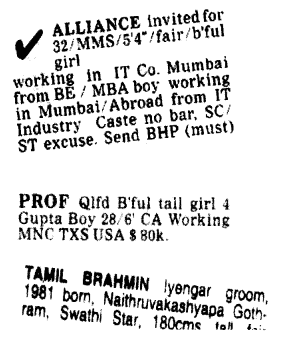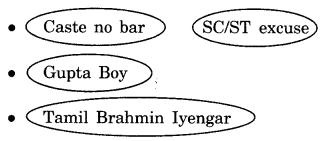GetStudySolution
Getstudysolution is an online educational platform that allows students to access quality educational services and study materials at no cost.
NCERT Solutions for class 7 Civics Chapter 1 – On Equality
Back Exercise
1. In a democracy why is universal adult franchise important?Answer
Universal Adult Franchise is important in democracy as:
(i) It is based on the principle of equality.
(ii) It means that all adult (those who are 18 and above) citizens have the equal right to vote.
(iii) It do not discriminate on the basis of social or economic backgrounds.
(iv) It is an important aspects of democratic societies
2. Re-read the box on Article 15 and state two ways in which this Article addresses inequality?
Answer
Article 15 in democracy of the constitution prohibits discrimination on grounds of religion, race, caste, sex or place of birth.
Two ways in which this Article addresses inequality:
(i) It suggests States not to discriminate against any citizen on grounds only of religion, race, caste, sex, place of birth or any of them.
(ii) No citizen shall be subject to any disability, liability and restriction on grounds only of religion, race, caste, sex, place of birth or any of them.
3. In what ways was Omprakash Valmiki’s experience similar to that of the Ansaris?
Answer
In following ways Omprakash Valmiki’s experience was similar to that of the Ansaris:
(i) Both of them discriminated by the society on the basis of their caste or religion.
(ii) Dignity and self respect of both of them get violated.
(iii) Both suffered from unequal treatment.
4. What do you understand by the term "all persons are equal before the law"? Why do you think it is important in a democracy?
Answer
The term "all persons are equal before the law" means that everyone will be given justice before law by treating them equal. From the President of the country to the common people, all are equal in front of law.
It is important in a democracy because: (i) Democracy suggests that no one should be treated on unequal basis because of their wealth, caste, colour, religion, gender etc.
(ii)It also ensures that no one will be given more preference for the same crime.
(iii) It provide the people equal opportunity to defend themselves in public court irrespective of their socioeconomic position.
(iv) It also reflects the true nature of democracy.
5. The Government of India passed the Disabilities Act in 1995. This law states that persons with disabilities have equal rights, and that the government should make possible their full participation in society. The government has to provide free education and integrate children with disabilities into mainstream schools. This law also states that all public places including buildings, schools, etc., should be accessible and provided with ramps.
Answer
No, I don't think the above law is being implemented in his case.
According to the Disabilities Act, all public places including buildings, schools, etc., should be accessible and provided with ramps which is not done in this case. Therefore, the buildings should be provided with ramps to make it accessible for the persons with disabilities.
Also, persons with disabilities have equal rights, and that the government should make possible their full participation in society but here the dignity and self respect of that person is hurt as someone is showing sympathy and extending their helping hands. The boy may feel pity or inferior in this case of being helped by other only due to disabilities.
It also affect the safety of that person as he may slip due to imbalance or carelessness.
In-text Questions
Question 1.
Do you think Kanta has enough reason to doubt whether she really is equal? List three reasons from the story that might make her feel like this. (NCERT Page 6)
Answer.
Yes, Kanta has enough reasons to doubt whether she is really equal.
Reasons:
- She cannot skip work even when her daughter is ill.
- She does not have enough money to take her daughter to the doctor.
- She has to stand in line at a government hospital for her turn to show her daughter to the doctor.
Question 2.
Circle the reference to caste in the matrimonial advertisements given below: (NCERT Page 7)

Answer.

Question 3.
Why do you think Omprakash Valmiki was being treated unequally by his teacher and his classmates? Imagine yourself as Omprakash Valmiki and write four lines about how you would feel if you were in the same situation as him. (NCERT Page 8)
Answer.
Yes, Omprakash Valmiki was being treated unequally by his teacher and his classmates because he was Dalit. We, as Omprakash Valmiki would feel humiliated and many questions would arise in our minds.
Like:
- do we not have soul, heart?
- are we not fit for education?
- why are we treated unequally?
Question 4.
Why do you think the Ansaris were being treated unequally? What would you do if you were in the Ansaris’ position and could not find a place to live because some people did not want to live next to you because of the religion you practice? (NCERT Page 8)
Answer.
- Ansaris were being treated unequally because they belonged to the Muslim religion.
- If we were in Ansaris’ position.
- We would go to the Minority Commission to lodge a complaint against the apartment owners.
- We would try to reason out with people.
Question 5.
If you were one of the Ansaris how would you have responded to the suggestion that you change your name? (NCERT Page 9)
Answer.
I would have responded in these words:
I will not change my name as there is nothing in the name, we all are God’s creation.
Question 6.
Can you think of an incident in your life in which your dignity was violated? How did this make you feel? (NCERT Page 9)
Answer.
- Yes.
- Disgusted.
(Answer will vary from student to student.)
Question 7.
What is the midday meal programme? Can you list three benefits of the programme? How do you think this program might help promote greater equality? (NCERT Page 11)
Answer.
- In the midday meal programme students of primary classes are provided lunch in the schools all over the country.
- Benefits:
- Truancy after recess has decreased.
- More and more children enroll themselves in the schools.
- Would help poor students and improve their concentration.
- Mothers do not have to leave their work in the mid.
- This programme might help promote equality as it would reduce caste prejudices.
- In some places, Dalit women are employed to cook meals for all children.
Question 8.
Find out about one government scheme in your area. What does this scheme do? Who is this scheme set up to benefit? (NCERT Page 11)
Answer.
- Sarva Shiksha Abhiyan (S.S.A.).
- This scheme provides education to those children who do not join schools for one or the other reason.
- This scheme is set to benefit Dalit children mostly.
Question 9.
How does Article 15 of our constitution address inequality?
Answer.
Article 15 of the Indian Constitution Prohibits discrimination and inequalities.
- It allows access to shops, public places, restaurants, etc. to all.
- The general public is allowed to use wells, tanks, bathing ghats maintained wholly or partly by state funds.